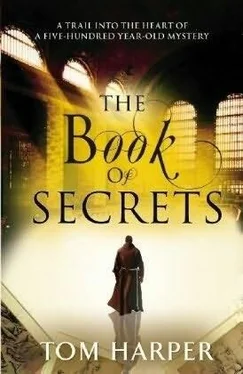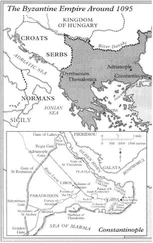I walked across the courtyard to the stairs.
‘Let me show you where it will happen.’
Rhineland-Palatinate, Germany
They spent the night in the motel. They’d paid in advance, and their hoard of euros was running out. When bedtime came they undressed and crept under the blankets together without discussion. They slept wrapped around each other, their naked skin the only warmth in the room. At seven, they rose and left.
A thick fog had come down on the heels of the snow, leaving the world a damp and lonely place. They crossed the Rhine at dawn and barely saw it, then turned north. Emily had the laptop out on her knees but didn’t open it; the white silence seemed to possess her completely. The only cars they passed were ghostly wrecks abandoned at the side of the road.
‘Mainz was Gutenberg’s home.’ Emily’s voice was hardly audible over the ineffectual clatter of the heater. ‘I wonder if that’s why Olaf chose it.’
Olaf had set the meeting for eleven o’clock at St Stephan’s church, a whitewashed building trimmed in red sandstone, capped by a bullet-nosed dome. It stood at the top of the hill behind the city: looking back from the terrace outside, Nick saw a snowy forest of roofs and aerials sloping down into the fog. For a moment he felt a powerful sense of dread, of unseen enemies sniffing for his trail in the snow. He shook it off and went inside.
It was like stepping into a fish tank. A soft blue light filled the church like water, so thick it was almost tangible. It came from the windows, a nebula of swirling blues speckled with white: birds in a cloudless sky, a starcloth, souls flitting into heaven.
Only at the back of the church, behind the altar, did the blue become a canvas for more literal illustrations. Nick walked up to examine them. An angel with fairy wings carried up a body that had swooned into its arms. A naked Adam and Eve considered an apple, while a blue serpent twined through the tree. A golden angel reading a book turned somersaults over a lighted menorah.
‘The windows are new. The church burned in the war.’
Nick turned sharply. A straight-backed old man wrapped in a moth-eaten blanket had rolled up behind him in a wheel-chair. His hooded eyes looked old enough to have seen the church’s devastation first hand. His lips curled in and hid whatever teeth he had left, while tufts of grey hair poked from under his battered hat.
‘The new windows are by Chagall,’ the old man continued. His tone was precise, unhurried. Nick guessed he didn’t have much to do other than collar unsuspecting tourists. Nick and Emily might be his only catch that day. ‘We were very proud in Mainz when so great an artist agreed to devote his work to our little church.’
‘They’re good.’ Nick tried to steal a glance over the old man’s shoulder. Olaf had refused to say how they would recognise him. Nick was terrified of missing him.
‘But I liked the medieval windows too. I saw them in my childhood, before the war. Very beautiful – and so exotic. Stags, lions and bears, birds…’
‘Flowers.’ Nick stared at him and tried to remember. ‘Wild men.’
‘Indeed. The medieval symbolism, so dense, you know? If you start to look close you never know where you go. ’
Emily took the plunge. ‘Are you Olaf?’
The old man coughed loudly. A nun kneeling in the front pew looked up from her prayers and frowned. ‘My name is most certainly not Olaf. But it serves. Let us find somewhere to talk.’
He waved away Nick’s offer to push him and led them to a pew at the back of the church.
‘I’m glad we found you,’ Nick said. ‘It was a clever trick, the way you hid your phone number.’
Olaf gave him a shrewd look. ‘You mean you are surprised a man of my age can even read email, let alone have heard of an IP address. But I have always sought knowledge. Many ways of finding it have come and gone in my lifetime.’
He manoeuvred his wheelchair against the end of a pew, leaning forward as if about to launch into prayer. Nick and Emily slid onto the bench beside him. He pointed to the wall, where a mounted photograph showed pyramids of flame leaping out of the burning church. All that could be seen of the building was a row of steep gable ends standing tall and black like witches’ hats.
‘God’s beauty is infinite,’ he said inscrutably. ‘Churches can be rebuilt, maybe more beautiful than before. But history. You cannot hire Chagall to restore that.’ He gave a heavy sigh. ‘Are you believers? Christians?’
‘Not really,’ said Nick.
‘I was, once. Then I decided I knew better. Now I am not so sure.’
A mournful silence gripped him as he stared at the windows, into some painful corner of the distant past.
‘You said you had something to tell us about Gillian,’ Nick prompted. Olaf didn’t seem to hear.
‘I was fourteen when the war ended.’
Nick did a quick calculation and was surprised by the result. It must have shown on his face.
‘You think I look older than I am.’ Olaf coughed again. ‘I feel older than I am. But I will come to that. For now, imagine me as I was. Old enough to have had a rifle pushed in my hands when Zhukov crossed the Oder; young enough to still have pride in Germany. Even when they told us the truth, all the things that make Germans ashamed today, I had pride. Those things were done by Nazis. I was a German.
‘That is why I became a historian. I wished to reclaim our history from the monsters and foreigners who took it away from us. I went back further and further into the past, trying to escape the poison that had infected us. While my generation built a new future with the Wirtschaftswunder, I wanted to dig its foundation. A new past. A clean past.’
He sighed. ‘You must understand, to be a historian in Germany is to be in thrall to a beautiful woman who has shared herself with everyone but you. There is hardly an archive or a library that has not been looted, burned, destroyed or lost at some point in its history. Sometimes facsimiles of original documents survive; sometimes even the copies have been destroyed. This has always been so – but after the war it was intolerable. A young researcher who wants to make a career needs documents, discoveries he can publish. But all our archives were only smoke and ashes. Until one day, in a convent library looking through old books of receipts, I found what I sought. A treasure.’
‘What was it?’ Emily asked.
‘A letter. A single sheet of paper written in a fifteenth-century hand. In the corner was a device: two shields blazoned with the Greek letters chi and lamda, joined by a noose that yoked the neck of a raven. I knew at once whose it was.’
He glanced up to see he still had their attention.
‘Johann Fust. You know Fust?’ Olaf was too far into the past to wait for their answers. ‘Fust was Johann Gutenberg’s business partner. You know Gutenberg, of course. Everyone knows Gutenberg. Time magazine says he was the Man of the Millennium. But if you came to Mainz five hundred years ago, everyone knew Fust and no one knew Gutenberg. Gutenberg printed one book; Fust and his son Peter Schoeffer printed one hundred and thirty. A letter from Fust is like a letter from St Paul. And I found it.’
‘What did it say?’
The knot of veins pulsed under Olaf’s knuckles as he fretted with the frayed blanket. ‘I should have published it. I should have told the librarian what I found. It would have stopped everything. But I did not.’
He took a furtive look around the church. ‘I stole it. Almost before I knew it, I slipped it into my pocket. At last I had found my princess sleeping in her tower. She would not give herself to me, so I took her. The archive had no security: they thought they had nothing worth taking.’
Читать дальше












